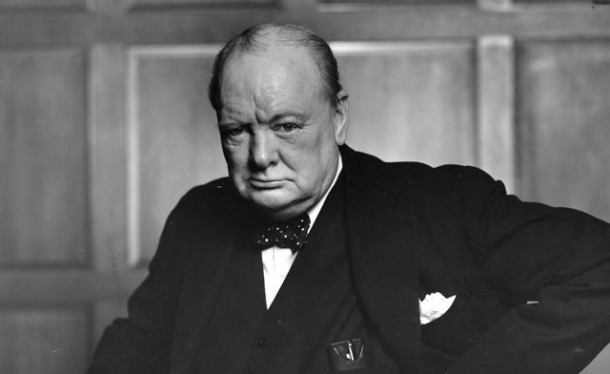
THUNDER BAY – OPININON – He’s likely had as much written about him as any political leader in modern times. Winston Spencer Churchill (aka: WSC) certainly was remembered in ceaseless conversations around the world over this past weekend regarding Churchill’s genius directing Allied forces in the incredible turning point victory in the Battle of Britain during World War 2.
As it was celebrated, around our Commonwealth, some 70 years in the aftermath of what became a more than pivotal showcase of a David and Goliath metaphor illustrating Churchill’s relentless campaign for freedom.
When–mercifully- Britain won its dogged, drawn out, almost totally exhausted crusade against Nazi forces.
It was Churchill’s natural flair, with his observant tact, that extolled his genius with his cunning ability to measure how to rebound in sky battles that raged over the City of London through all hours of any day or night.
But what really marked Churchill as a leader was his way in saying things to a beleaguered nation of Brits.
For Churchill’s talent in constructing affirmative word-bridges in thoughts and sayings to reunite the souls of a weary population was his resilience and tolerance in all things. Be it a retreat in battle.
Facing the unknown foggy elements that hovered over England as his populace could hear the Luftwaffe but not see their machines in the sky. Or his resolute bulldog image not budging in holding, inspiring his military defenses, to pluck onwards – always.
Few realize Churchill had already had his own share of incredible setbacks, which become part and parcel of the pulsing heartbeat, rock solid aggregate ways that became him.

He was a poor student, at first, in Education. He had been forced to repeat a class in grammar school.
Besides much later in his earlier political career Churchill’s mismanagement in decisions made in the Commonwealth’s defeat at Gallipoli, in the Dardanelles, versus the Turks and Germans
That would have scarred his career had Church not rebounded. With an unbounded fortitude that seemed a Godsend to Allied enlistees fighting on the shores of the British Isles, or, across the waves in Europe and North Africa.
One of the greatest tools Churchill (1874-1965) developed wasn’t really a physical tool. It was Churchill’s ability to pick the right words in his speeches. He was a superb master in the ancient art and forum of speech making.
Once researching at the Parliamentary Library, in Ottawa, I discovered an essay by WSC called: The Scaffolding of Rhetoric.
Churchill started it in November of 1897. It was never published. I wrote in my notebook about his notion of impacting lives with his with perceptive use of grammar.
He wrote, ‘‘of all the talents bestowed upon men none is precious as the gift of oratory. It has a power more durable than a king. Even a political meeting with pessimistic and grave forces mixed with cynicism is unable to resist the influence a erudite speaker may claim. Others will be shaken by the passion brought forward.”
The depth of Churchill’s gleaming craftsmanship with language comes across at whatever stages one reads, follows his course, in life.
Let’s not forget Churchill emerged from 20th century decades when the medium of sharing weekly ideas was in the form of newspapers, pamphlets, and books. Well before the radio-in-every-home retro fit, and, later the invention of television arriving much later through time.
Yet we need never to forget how totally heartbroken Churchill was when Anglo-Irish and Anzac Forces were totally crushed by Turkish forces at Gallipoli in 1915.
There, Allied troops were stretched out on the terrain. Battling for their lives. Suffering outright. Beneath the sweltering sauna-like heat of the Dardanelles. They were unmercifully pinned to the arid ground by machine-gun fire. They had to resort to sucking on pebbles to keep their mouths moist.
Trying to find another endurance level as their military energies were drained. It became a grand loss.
It resulted in one of the greatest, most humiliating, losses in the history of the British Empire.
Soon Churchill recoiled. Re-emerging perhaps no one else but Churchill himself might have.
Somehow Churchill assumed a renewed strength in leaning forward. He thought to himself, from time to time, he may have lost what gifts he thought he possessed in inspiring others. He occasionally did doubt himself. Thinking part of his makeup may have slipped away forever.
But In time his speech-making qualities were re-honed. His returning fortunes were found in other opportunities. Like a boomerang returning for a fresh toss he would check his stance. Weigh the heft of what he held in his hand. The need to fling far and wide his political ideals aimed at newer targets; Fresh ventures that would consume both his patriotism and his persistence.
Churchill’s subsequent political existence following the Armistice of the Great War saw him capture elements that would be buoyant as his Nation entered World War 2.
It seemed Churchill developed ‘savior-like’ methods that elevated an entire Commonwealth being besieged by the maniacal methods invading armies were spewing out across continental Europe.
In those years of maintaining his country’s defenses Churchill’s legacy would be constructed within his timely built, and fascinating, masonry with words.
British historian Max Hastings says Churchill ”was one of the greatest human beings of the twentieth century.”
Curious in the beginning of his gentle meteoric rise he was in Canada, on a morning in Winnipeg, in 1901 when was informed Queen Victoria died.
“I need to get back to England,” Churchill commented immediately. He was resolutely British. Defiantly a political observer, so proud, not yet understanding the unscripted paths destiny seemed mapping before him.
Then, on May 10, 1940 when King George VI summoned Churchill to form a new Government while menacing European events exploded everywhere imaginable Churchill promised his famous promise. ”I have nothing to offer but blood, toil, tears and sweat.” He infused his compassion with, ”Come now. Let us go forward. With our united strength.”
And studying Churchill’s future mission with ‘Operation Overlord’ (The Allied code for coming of Normandy and D-day) it will remain Churchill’s resolve, along with the United States, to brilliantly defer and postpone an earlier charge.
In 1944 they collectively reasoned –rightfully acknowledged, later, by historians—before sending forces they would be better to creatively allow time to a think-slow moratorium while designing the greatest amphibian strike ever.
Becoming a strategically key factor. For Anglo-American negotiations devising this assault were well in the works going back to that January. What occurred on then on the 6th of June was one of the most phenomenal semi-surprise Victories anyone might have dreamed of.
Captured in wartime photos saw Churchill holding his right hand aloft.
With his first fingers splayed to illustrate his iconic V, His tribute to the armed forces.
Plus the incredible civilian populations everywhere who mustered such backbone strength in resistance.
The abundance of joy in the hearts of millions would savor such a Churchillian brightness to rise with splendid of newborn dawns across their Island.
Yet, in the British House of Parliament one day Churchill finished speaking and sat for a necessary breather. The overwhelming fatigue of his negotiations, the sleepless nights, his dreams of a new horizon brought a trickle of tears down his cheek. He used a handkerchief. Stood upright. While simultaneously receiving a booming standing ovation of shouts and cheers from all parties present.
It was a moment present day media would have filmed and re-shown time and again for its forthright honesty in human emotion unbridled by their political persuasions imbedded in their seating plans at Westminster.
To this end a study and review of Churchill not only brings one into contact with a host of biographers and world chroniclers it also gifts the researcher with words Churchill, the inimitable orator, left us to consider and reflect on.
Presently, as we approach our own regional elections ongoing, a few nuggets from Churchill’s speeches as he witnessed his era, are collected.
He said things like this:
1. To build may have to be the slow and laborious task of years. Though to destroy can be the thoughtless act of a single day.
2. Success is not final. Failure is not fatal. It is the courage to continue that counts.
3. No use saying, ‘we are doing our best. ‘You have got to succeed in doing what is necessary.
4. To improve is to change. To be perfect is to change often.
5. My success, having a failed class in school that taught me much about good writing the next time around, has moved from one failure to another failure. With no loss of enthusiasm.”
Prior to so many revelations about his diction Churchill also experienced a kind of soothsaying day when he spoke these prophetic words. Well before so much else.
In 1933 Churchill noted, ”it may well be the most glorious chapters of our history have yet to be written.”
He paused, like a Shakespearean actor, went on, “yet the very problems and dangers that encompass us ought to make English men and women of our generation glad to be here at such a time. For we are guardians of our country where her life is at stake.”






